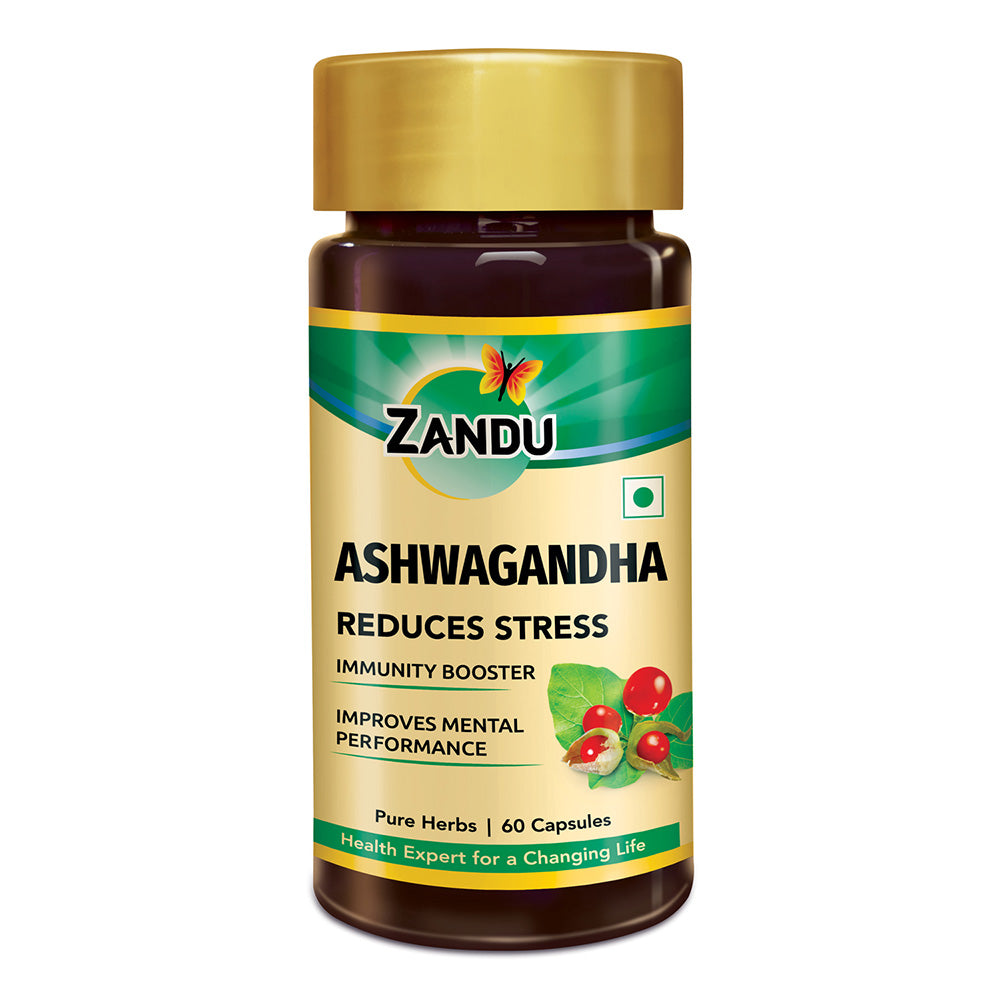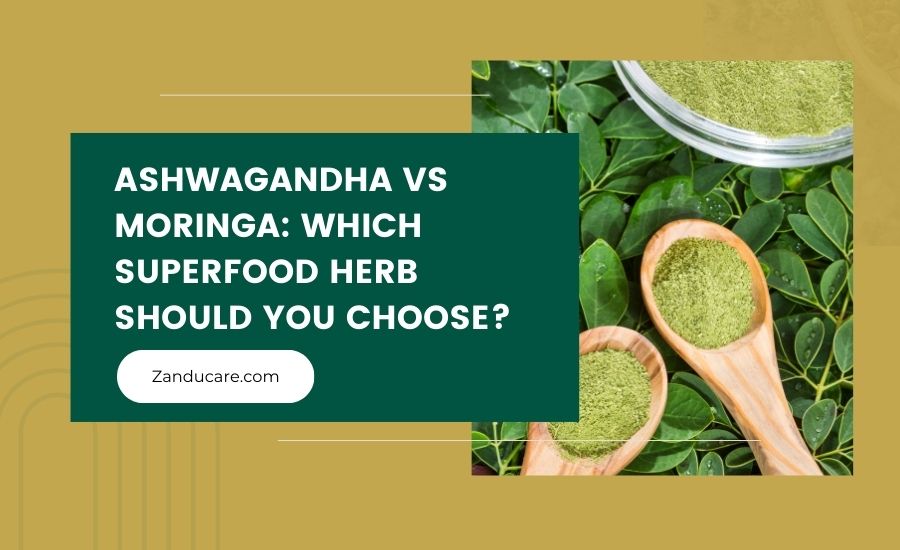
Reduces Stress & Cortisol, Improves Sleep and Muscle Recovery, with over 5% Withanolide Content | Scientifically Tested

Reduces Stress & Anxiety | 100% Natural Active | Root Extract | Improves Mental Performance | Scientifically Proven


Key insights:
Ashwagandha and Moringa have both earned reputations as superfood herbs. They have exceptional nutritional profiles and provide a variety of potential health benefits. But which one should you add to your diet or take as a supplement? We’ll compare their nutrient content, proposed benefits, safety, and optimal dosage to decide.
We’ll also discuss which health goals Ashwagandha might better serve than Moringa. With this comprehensive comparison, you’ll be able to determine which superfood herbs are right for your needs.
Did you know:

Ashwagandha, known as "Indian ginseng," is a powerful adaptogen that helps manage stress, boost immunity, and enhance energy levels. It also supports brain health and improves mood.
Moringa, often called the "drumstick tree," is packed with vitamins, minerals, and antioxidants. It aids digestion, reduces inflammation, and promotes heart health. Both herbs have been used for centuries in traditional medicine for their natural healing properties and are now commonly found in supplements, teas, and powders to enhance overall wellness.
|
Nutrients |
Ashwagandha |
Moringa |
|
Energy (Calories) |
245 kcal (root); 92 kcal (fresh leaves) |
64 kcal (leaves) |
|
Protein (g) |
3.9 (root); 6.7 (fresh leaves) |
9.4 (leaves) |
|
Fat (g) |
0.3 (root); 1.7 (fresh leaves) |
1.4 (leaves) |
|
Carbohydrates (g) |
49.9 (root); 12.5 (fresh leaves) |
8.28 (leaves) |
|
Fiber (g) |
32.3 (root); 0.9 (fresh leaves) |
2.0 (leaves) |
|
Vitamin B1 (mg) |
0.06 (fresh leaves) |
0.257 |
|
Vitamin B2 (mg) |
0.05 (fresh leaves) |
0.66 |
|
Vitamin B3 (mg) |
0.8 (fresh leaves) |
2.22 |
|
Vitamin C (mg) |
3.7 (root); 220 (fresh leaves) |
51.7 |
|
Vitamin E (mg) |
448 (fresh leaves) |
4.5 |
|
Calcium (mg) |
23 (root); 440 (fresh leaves) |
185 |
|
Magnesium (mg) |
42 (fresh leaves) |
42 |
|
Phosphorus (mg) |
70 (fresh leaves) |
112 |
|
Potassium (mg) |
259 (fresh leaves) |
337 |
|
Copper (mg) |
0.07 (fresh leaves) |
0.11 |
|
Iron (mg) |
3.3 (root); 0.85 (fresh leaves) |
4.0 |
|
Sulphur (mg) |
870 (leaf powder) |
– |
|
Aspect |
Ashwagandha |
Moringa |
|
Botanical Name |
Withania somnifera |
Moringa oleifera |
|
Common Names |
Indian Ginseng, Winter Cherry |
Drumstick Tree, Miracle Tree |
|
Part Used |
Roots, primarily leaves, seeds, and berries, are also used |
Leaves, seeds, pods, flowers |
|
Nutritional Content |
Rich in dietary fibre, with notable amounts of vitamin C, iron, and calcium |
High in vitamins A, B, C, and E, calcium, potassium, and protein |
|
Medicinal Properties |
Known for adaptogenic (stress-relieving) and anti-inflammatory properties, enhancing mental clarity |
Known for its antioxidant, anti-inflammatory, and antimicrobial properties, supporting immunity |
|
Primary Benefits |
Stress relief, enhanced energy, improved muscle strength, better sleep, and hormone balance |
Nutritional supplement boosts immunity, support digestive health, and provide essential nutrients |
|
Bioactive Compounds |
It contains withanolides that reduce inflammation, lower cortisol, and boost immune health |
Rich in polyphenols, flavonoids, and glucosinolates, offering antioxidant and anti-inflammatory benefits |
|
Traditional Uses |
Used in Ayurveda to reduce anxiety, improve vitality, and balance Vata and Kapha doshas |
Widely used in traditional medicine to treat malnutrition, improve skin health, and support lactation |
|
Preparation |
Typically consumed as powder, capsules, or in teas and tinctures |
Often eaten fresh, dried, or powdered, used in smoothies, teas, soups, and salads |
|
Best for |
Individuals looking to manage stress, boost energy, and improve sleep |
Those needing a nutrient-dense supplement to support immunity, skin health, and digestion |
Here are the health advantages of Ashwagandha and Moringa:
Below are the benefits of Ashwagandha for your health:

Studies show that Ashwagandha may help reduce anxiety and stress. In one 2019 study, people who took 240 milligrams of ashwagandha daily had significantly lower stress levels than those who took a placebo. Ashwagandha also lowered their cortisol levels, a hormone released when the body experiences stress.
In another 2019 study, people who took either 250 mg or 600 mg of ashwagandha per day reported lower stress levels and cortisol levels.
While these study results are promising, more research is still needed before scientists can definitively recommend ashwagandha as an herbal treatment for anxiety. We need scientists to do more high-quality studies on larger groups of people to confirm ashwagandha's anti-anxiety effects. However, the initial research shows it has potential as a natural remedy for anxiety relief.

Ashwagandha might improve the quality of your sleep. Sleep efficiency, total sleep duration, and sleep latency—the amount of time it takes for a person to fall asleep—all improve with Ashwagandha extract. Actigraphy, a technique that tracks body movements by wearing a watch monitor, was used to measure these changes.
Many cancer patients deal with feelings of stress, anxiety, and tiredness. Some of these people look into non-drug remedies to help them find relief from these issues. The herb Ashwagandha might be one natural option for them to consider.
A review of studies from 2023 found that Ashwagandha might have some anti-cancer abilities. However, there currently isn't enough good research to show that taking Ashwagandha can prevent or treat cancer itself.
More high-quality scientific studies are needed to understand if ashwagandha could actually help prevent or improve cancer in people. So far, the research is too limited to say whether or not Ashwagandha works against cancer. However, some early findings suggest that it might have some anti-cancer effects. More studies are needed to confirm if this is true or not.

A review of four studies examined how taking ashwagandha for 90 days affects sperm health in men. The studies found that compared to men who did not take Ashwagandha, men who took the herb had increases in sperm concentration (number of sperm per millilitre), semen volume (amount of fluid in one ejaculation), sperm movement (motility), luteinising hormones (which signal testosterone production), and testosterone levels.
More high-quality research on larger groups of men is still needed to confirm that Ashwagandha improves male reproductive health.
A small study suggests that Ashwagandha may alleviate symptoms of rheumatoid arthritis. After taking 100 mg of Sidh Makardhwaj, another Ayurvedic medication, daily for four weeks and 10 grams (g) of Ashwagandha powder daily for three weeks, study participants reported feeling better. Sidh Makardhwaj is a mercury-based substance used to treat neurological conditions and rheumatoid arthritis.
Do check our 100% Ayurvedic Ashwagandha products:
Here are the health benefits of Moringa:

A lab study found that Moringa might help skin wounds heal faster. Also, it showed that Moringa reduced oxidative stress, which could promote wound healing. However, some experts also say that applying Moringa seed oil directly to hair may improve hair health.
However, more research is still needed to confirm these benefits, especially studies done in people rather than labs. While early lab results promise that Moringa can help skin and hair, scientists need to do high-quality human studies on larger groups to verify that moringa has these effects when used on the body. More evidence is still needed through clinical trials.
Antioxidants help fight oxidative stress, an imbalance between antioxidants and cell-damaging free radicals in the body. Ongoing oxidative stress is linked to chronic illnesses like cancer, heart disease, and diabetes. The Moringa tree contains many phenolic compounds, which are plant molecules with anti-inflammatory effects.
Specifically, parts of the Moringa tree have flavonoids, phenolics, and carotenoids. Studies show these phenolic compounds may boost immunity, prevent disease, and reduce inflammation. More research is still needed, but early findings suggest the phenolic compounds in Moringa may provide important health benefits.

A few studies on animals show extracts from Moringa leaves can act as a vasodilator, meaning they relax blood vessels, which helps lower blood pressure. The leaves may also counter oxidative stress. Additionally, human studies found Moringa may reduce high blood pressure.
One study gave subjects 120 grams of cooked moringa leaves for one week, resulting in decreased overall blood pressure compared to the control group. Another study in obese males with high blood pressure found taking Moringa leaf significantly lowered both systolic and diastolic pressure.
A lab study found certain compounds in moringa may help protect the liver from nonalcoholic fatty liver disease (NAFLD). The compounds reduced fat accumulation in liver cells and boosted protein activity that breaks down fat. This suggests moringa has the potential to prevent or treat NAFLD.
However, the study was not done in humans - it used liver cells in a lab. More high-quality human research is still needed to confirm whether consuming moringa protects liver health in people with NAFLD. The early lab study shows promise, but clinical trials are necessary to verify actual effects in humans.
Moringa leaves and seeds provide important vitamins, minerals, and fats that can help address malnutrition (not getting proper nutrition). Specifically, moringa is rich in vitamin C, A, and fibre. One small study found taking moringa leaf powder increased body mass index (BMI) scores in people with HIV on medication.
While BMI has flaws in assessing health, the findings suggest moringa may boost nutritional intake for some groups at risk for malnutrition, like HIV patients. However, larger studies are still needed to confirm moringa's effects on nutritional status in diverse populations.
Here are the common side effects of both Ashwagandha and Moringa:
Stress + Nutrition Support:
Hormonal Balance & Immunity:
Energy + Vitality:
You can take both in capsule, powder, or tea form, preferably in the morning or before bed, depending on your goal.
Do have a look at our Other Ashwagandha Comparison Guides:
Both Ashwagandha and Moringa offer significant health benefits, though they serve different purposes. Ashwagandha is a potent adaptogen, helping reduce stress, boost energy, and improve sleep quality, making it ideal for mental well-being. Moringa, rich in vitamins, minerals, and antioxidants, is best for nutritional support, immune health, and digestion.
When choosing between them, consider your primary health goals: Ashwagandha suits those seeking relaxation and stress relief, while Moringa is better for overall nutrition and immune support. Both herbs can complement each other in a balanced wellness routine, providing comprehensive health benefits.
Ashwagandha is known for reducing stress, improving sleep, boosting energy, and supporting brain health. It also has potential benefits for hormone balance and muscle strength.
Moringa is rich in essential nutrients like vitamins A, B, C, and E, along with minerals such as calcium and potassium. Its high antioxidant content supports immune health, digestion, and skin health, making it a powerful nutrient source.
Yes, Ashwagandha and Moringa can complement each other when taken together. Ashwagandha helps manage stress and improves mental well-being, while Moringa provides essential nutrients for overall health.
Ashwagandha is more effective for stress relief due to its adaptogenic properties, which help the body manage stress and balance cortisol levels.
Some may experience mild digestive issues, such as upset stomach or diarrhea. It is generally safe for short-term use, but consult a doctor if pregnant, breastfeeding, or taking medications.

Reduces Stress & Cortisol, Improves Sleep and Muscle Recovery, with over 5% Withanolide Content | Scientifically Tested

Reduces Stress & Anxiety | 100% Natural Active | Root Extract | Improves Mental Performance | Scientifically Proven
Leave a comment
This site is protected by hCaptcha and the hCaptcha Privacy Policy and Terms of Service apply.